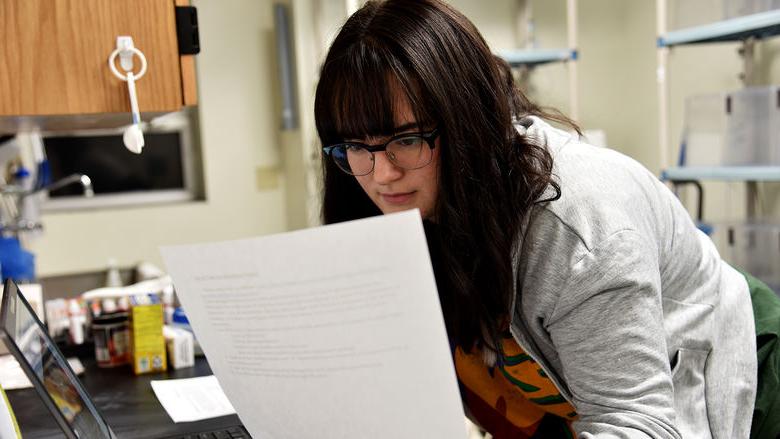- Clearances for students working with children or other vulnerable populations
- Internships Abroad
- International Students
- Students with Disabilities
- Retroactive Credit
- Risk Awareness and Management
Clearances for students working with children or other vulnerable populations
Students applying for an internship with a significant likelihood of regular contact with children or other vulnerable populations, e.g., persons with disabilities or elderly adults, must obtain FBI, Criminal, and Child Abuse History Clearances.
Penn State Altoona's Elementary and Early Childhood Education program maintains up-to-date information on obtaining these clearances. For the latest information, visit the Elementary and Early Childhood Education program site.
Internships Abroad
Interning abroad requires considerable foresight and planning. Be sure to consult with your academic adviser about how an international internship will fit into your academic degree program.
Penn State Resources
- Penn State Altoona Office of Education Abroad
- University Office of Global Programs
Several established, Penn State-approved education abroad programs include an internship component. You can search for these programs using the OGP search engine with the search term “internship.”
International Students
Please visit the International Student Services page early on when considering an off-campus work experience. You should also consult the Curricular Practical Training program overview on the University’s Global Programs Web site. CPT is available to F-1 students.
You might also consult the Job Search for International Students site.
Students with Disabilities
Penn State Altoona’s Academic Internship Office is committed to helping students with disabilities to succeed in their studies. We will make every reasonable effort to identify and suggest suitable host sites that may offer appropriate accommodations. However, the College does not have authority over cooperating organizations and cannot guarantee that a student's unique needs will be met. In all cases, students must demonstrate the ability to perform the essential tasks of specific assignments, with or without assistive technology. For more information, visit the Penn State Altoona Health and Wellness Center Web site.
External Resources:
- Job Accommodation Network
- Career Opportunities
- U.S. Dept. of Labor, Office of Disability Employment Policy
Retroactive Credit
No academic credit can be approved retroactively for any experience.
Risk Awareness and Management
Risk management is concerned with the outcome of future events that cannot be predicted with certainty, and how to handle this uncertainty.
There are four basic steps in being aware of, and managing, risk:
- Identify potential risks
- Understand guidelines and expectations from the College and employer perspectives
- Consider solutions to potential problems beforehand
- Inform your Penn State Altoona faculty supervisor about any concerns.
Should an incident take place:
- Be sure to document all facts such as date, time, persons involved, and the situation as you observed it.
- Inform your faculty supervisor immediately.
This list of potential risks is in no way comprehensive. It is meant as a stimulus for you to reflectively examine your internship environment and circumstances.
Travel
- To and from the site – be aware of dangerous intersections, streets or stretches of highway
- Parking garages or poorly lit parking areas
- Using your car, or a vehicle provided for you, for organization business:
Find out all policies dealing with- Reimbursement of funds expended out of your pocket
- Transporting clients
- Transporting sensitive or easily-damaged materials
- Transporting potentially hazardous materials
Physical Hazards
- Working outdoors – sun, snow, and ice, other extreme weather, pollution, power lines, pipelines, electromagnetic radiation, gas leaks
- Working indoors – any type of machinery, unsuitable working conditions such as extreme temperatures, asbestos, “sick building” odors, insecure buildings where there may be structural concerns, closed off or blocked fire escapes, etc.
Biological Hazards
- Animals you may work with/upon – dead or alive (“mad cow” disease)
- Poisonous plants
- Infected birds (e.g., West Nile virus ) or fish
Chemical Hazards
- Water Supply
- Toner powders from laser printer cartridges or photocopiers – eye or lung irritation
- Chemicals in a laboratory setting – eyes, open sores, inhalation
Interpersonal Hazards: Harassment
- Sexual, age, ethnic, racial or disability harassment of student workers, or any employee, is illegal
- The employer must ensure that regular full-time employees, or other interns, do not harass student workers.
- Immediately report any harassment to your Penn State Altoona faculty supervisor.
- Resolution may include placing you in another position.
- Harassment of others by you in the workplace may result in your dismissal from the program.
Sexual Assault
There are several ways to reduce the risk of becoming a victim of sexual assault:
- Set limits; don’t give mixed messages.
- Trust your “gut feeling” about situations to avoid.
- Be clear and responsible in your communication with others.
- If necessary, be forceful, firm, and assertive in your communication with others.
- Be aware of nonverbal cues that can alert you to a problem.
- Remember, silence is not consent.
- Don’t assume the other person knows what you do or do not want.
- Use the “buddy system” when feasible. Watch out for your friends.
- Don’t lose control: alcohol and other drugs affect your judgment.
- Avoid secluded places in any relationship.
- Do not assume that if you are with a friend or an acquaintance, nothing bad will happen.
- Devise an action plan in advance for what you will do if confronted with a situation of possible acquaintance rape. Remove yourself from the situation at the first sign that you are feeling controlled or unsafe.
- Become comfortable with the idea that you might have to be rude, make noise, yell, etc. to remove yourself from a possible sexual assault situation. Do not worry about hurting the other person.

